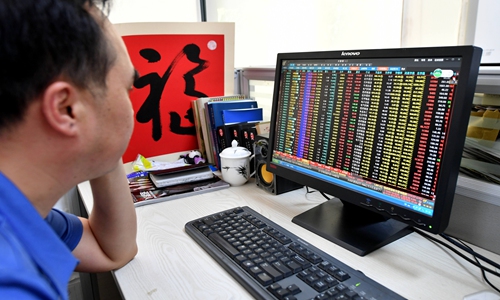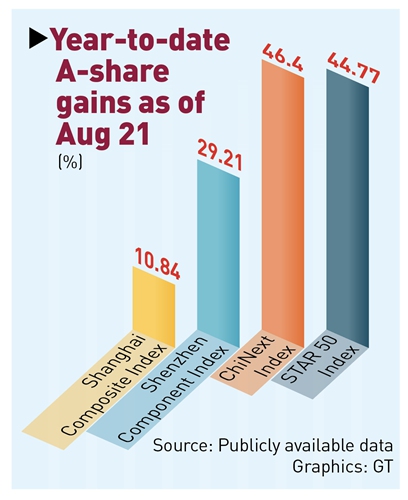SOURCE / MARKETS
ChiNext reform offers new channel
US-listed companies can tackle sanctions via tech board

An investor tracks A-share performance in Fuzhou, capital of East China's Fujian Province, on Monday. Photos: CNSphoto
The nation's new listing reform on the tech-heavy, NASDAQ-style ChiNext board will create another channel for US-listed Chinese companies to shift to Chinese mainland capital markets, at a time when the Trump administration in seeking a crackdown on mainland-based companies, experts said.
The expansion of market-based reforms of the mainland capital markets also helped some companies relieve financing pressure when the global economy is being battered by the coronavirus epidemic.
On Monday, the first batch of 18 companies, which raised more than 20 billion yuan ($2.89 billion) in total, will start trading on the ChiNext board under the new registration-based paradigm.
The move marks a new start for the 11-year-old technology startup board, as companies hoping to list on the exchange no longer need to get approval from the regulators or show a record of profits to conduct IPOs.
The reforms are modeled on rules at the much younger Shanghai-based Science and Technology Innovation Board (STAR Market). In slightly more than one year, more than 130 mainland-based companies have listed on the STAR Market, including influential high-tech startups like chipmaker Cambricon and Semiconductor Manufacturing International Corporation.
"The expansion of listing reforms to the ChiNext offers another choice for US-listed Chinese companies seeking secondary listings, as conditions for their survival are deteriorating on the US capital markets," Dong Shaopeng, an adviser for the China Securities Regulatory Commission, told the Global Times Sunday.
Xi Junyang, a professor at the Shanghai University of Finance and Economics, told the Global Times Sunday that compared with the STAR market, which is mostly geared to the needs of high-tech companies, the ChiNext board is more accommodating and can accept companies as long as their business is innovative.
"For US-listed Chinese companies that are inclined to shift to A-share markets but lack high technology, I believe the ChiNext will be their choice," Xi told the Global Times on Sunday.

Experts also noted that the reforms, which eased the listing standards, will support the Chinese economy amid pressure from the coronavirus.
"More companies will be able to go public after the registration-based reforms, which can balance supply and demand on the capital markets and support China's real economy," Li Daxiao, chief economist at Shenzhen-based Yingda Securities, told the Global Times Sunday.
Dong noted that the reforms mark China's further steps toward marketization. "China is marching forward with its own mission of market-oriented reforms regardless of external turmoil, and with those reforms, mainland capital markets will attract international capital," he said.
However, experts cautioned that China might face challenges in the course of those reforms.
"As the new rules have relaxed the requirements on profitability, it's hard to say whether those companies can really evolve into competent ones or if the board will be stuck with low-quality firms," Xi said, adding that time will tell if China's regulations on information disclosure and delisting can be executed in an appropriate way.
He also cautioned that ChiNext stock prices might be very volatile in the short term as a result of the reforms.
There will be no price limits during the first five trading days for a newly listed stock. After that, shares will be allowed to rise or fall up to 20 percent during a trading session, compared with 10 percent previously.
Existing stocks traded on the ChiNext board will be subject to the 20-percent daily trading limit starting Monday.




